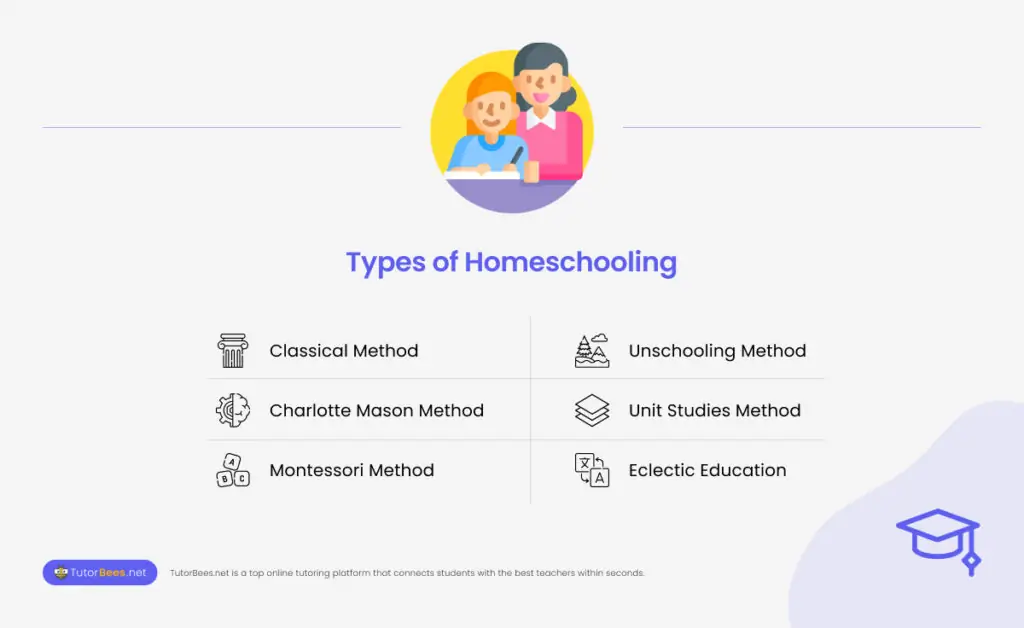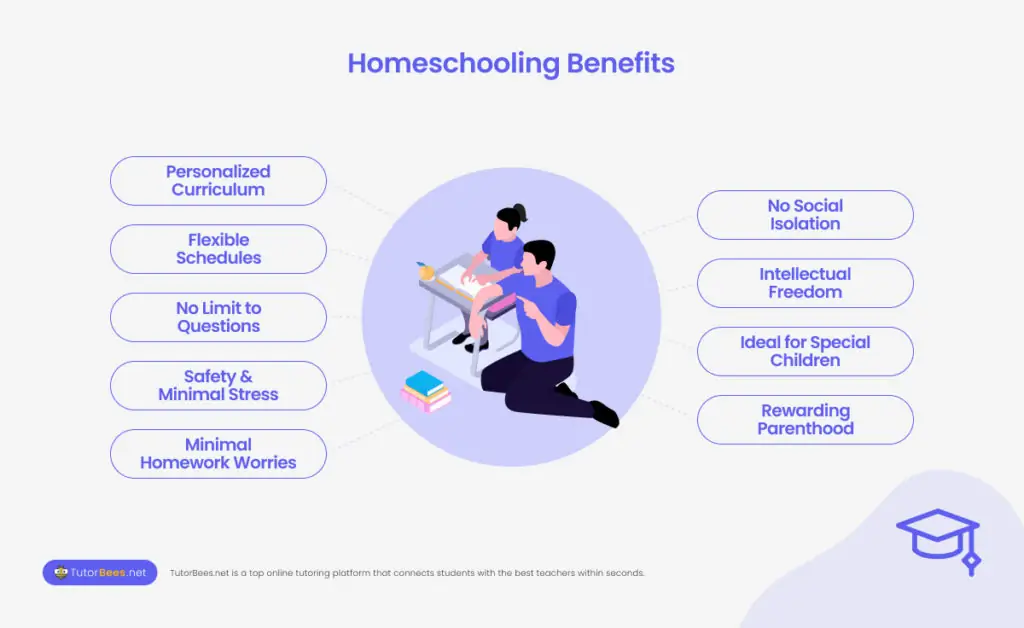The Oxford Dictionary defines homeschooling as ‘The practice of educating children at home, not in schools”. Generally, it refers to parents educating children at home instead of sending them to school. Parents determine what the kids will learn and which teaching method is valid. There could be several reasons why parents prefer to educate their kids at home, such as disapproval of the school curriculum, distinct religious or socioeconomic ideologies, and widespread criticism of the modern education system.
The COVID-19 pandemic has brought tremendous challenges. It has impacted almost every sector of society and economy, especially the education sector, as it caused an unprecedented shutdown of schools. On the other hand, it has also triggered a homeschooling boom[1]. According to a report, nearly 20% of American families now homeschool their children, up from 3% two years ago[2].
Types of Homeschooling

Types Of Homeschooling
Classical Method
The Classical method is the most popular type of homeschooling, drawing inspiration from the educational techniques of Ancient Greece and Rome. It emphasizes teaching Classical Greek and Roman texts and Bible-related education.
Students learn facts and data and acquire knowledge of logic, rhetoric, and critical thinking. This method also uses Socratic dialogues - an argumentative question and answer technique used by Socrates – to enhance students’ knowledge.
Charlotte Mason Method
The Charlotte Mason technique extensively focuses on the use of narrative literature. It encourages outdoor and nature pursuits; and uses living books, narration, memorizations, nature studies, music, and picture observations to foster educational tendencies in children. This approach is cost-effective and flexible and offers students a chance to scrutinize their subject directly.
Montessori Method
The Montessori method nurtures creative learning and offers personalized interest-focused education compared to formal education. Children can touch, experience, and use everyday objects like toys and tools they encounter. It uses bigger time slots for teaching, generally up to 3 hours. This technique tends to be advanced and child-sensitive.

Montessori Method of Homeshcooling
Unschooling Method
The Unschooling method follows an unconventional approach. It is embedded in the principle that time and place do not restrict learning. The unschooling method focuses on honing children’s reading, writing, and arithmetic skills and facilitates learning through technology and varied materials.
Suggested Read: Why Should Kids Read William Shakespeare?
Unit Studies Method
The Unit Studies technique emphasizes thematic learning. Students learn about a particular topic from the perspective of each subject domain. For example, students might study French Revolution in a history class, France in geography class, and learn French in a language class. Unit studies offer great flexibility and combine varied learning approaches to match student interests.
Eclectic Education
The Eclectic Education method is one of the most popular homeschooling methods. It fuses various methodologies and techniques to suit the requirements of the learners. There is no set time or place to impart eclectic education. Moreover, you can combine multiple homeschooling methods too – Explore nature by using the Charlotte Mason method while on other days interact with toys using the Montessori method.
Homeschooling Benefits

Homeschooling Benefits
Personalized Curriculum
The education curriculum of homeschooling allows parents to modify the curriculum and the teaching method to suit the interests of the children. In contrast to conventional schooling, students can receive personalized one-on-one education.
Flexible Schedules
Homeschooling enables kids and parents to evade stressful rigid schedules. Parents can schedule the times that suit them and their kids. Class and recess timings do not affect constraint students. Similarly, they can also plan a schedule for the extracurricular activities for children.
No Limit To Questions
In a traditional school setting, it may not be possible for children to get answers to all questions. However, the one-on-one teaching element of homeschooling allows your kids to ask complex and straightforward questions and receive answers accordingly.
Safety And Minimal Stress
Learning at home safeguards your children from the harmful elements of conventional schooling. Kids will not face exposure to peer and social pressures, and they will neither be vulnerable to bullying and drugs. Sometimes traditional education can become overbearing for children with excessive workloads; homeschooling offers versatility in workload to reduce stress.
Minimal Homework Worries
Kids are unswervingly involved in the learning process; hence there is little or no need for homework. It can save a parent’s time and lessen the study burden on children.

Minimal Homework Worries in Homeschooling
No Social Isolation
It is a myth that homeschoolers lack social skills. They can polish their social skills by making friends when pursuing extracurricular activities. In addition, children can interact with various age groups, younger or older, which can brush up their interpersonal skills.
Also Read: Online Extracurricular Activities for Kids
Intellectual Freedom
The conventional school setting does not offer much intellectual freedom to students. Conversely, homeschooling provides space for kids and encourages them to be intellectually independent when pursuing education. Homeschooled college students appeared to be much more independent in their learning techniques. Likewise, homeschoolers were most likely to seek out the solutions independently when it came to problem-solving skills.
Ideal For Special Children
If a child suffers from physical, developmental, emotional, and sensory impaired disorders, they may suffer from prejudice and social stigma at school. However, homeschooling offers such children the utmost attention for their unique needs.

Homeschooling for Special Children
Rewarding Parenthood
Parents are deeply involved in the homeschooling process. It allows them to spend quality time with their children resulting in nurturing deep bonds.
Drawbacks
Slower Pace
Without proper knowledge of education, parents may not be able to effectively impart knowledge to their kids, which can slow down the learning process. This situation can aggravate when topics become more complex, leading to bewilderment and indifference towards education.
Expensive
Homeschooling can be exorbitant. Unlike public schools, which receive public funding, homeschooling is devoid of such a benefit. Therefore, the parents must bear the entire cost of homeschooling. This cost will typically cover the syllabus, extracurricular activities, and field trips.
Lack of proper facilities
Homeschooling cannot make up for the ample facilities available in a school. Homes cannot offer access to massive libraries, science laboratories, and sporting facilities.
Huge Parental Responsibility
In homeschooling, though students are expected to work independently, the teaching duty has to be performed by the parents. Hence, parents will have to stick to a schedule and divide their teaching and responsibilities accordingly.

Parental Responsibility in Homeschooling
Conclusion
Parents prefer homeschooling over traditional schooling due to disapproval of the education curriculum or concerns about the school atmosphere. Homeschooling offers a plethora of benefits and can be rewarding. Contrarily, it also has some drawbacks and is not for every child and parent. Therefore, a thorough assessment of all pros and cons is imperative before any commitment.
Also Read:
Image Source: Shutterstock
References
[1] “The Pandemic Set Off a Homeschooling Boom. Don’t Be So Sure That a Bust Is Coming.” Reason.com
[2] “Nearly 20% of American Families Now Homeschool, Up From 3% Two Years Ago.”




